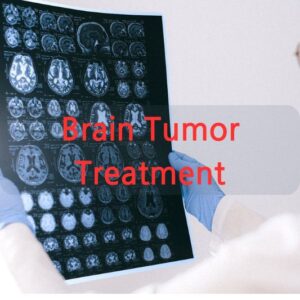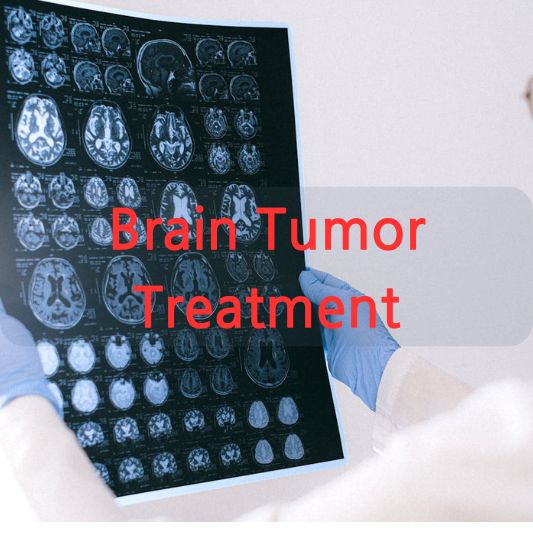I. Introduction
Brain tumors are abnormal growths of cells in the brain. They can be benign (non-cancerous) or malignant (cancerous) and can occur at any age. Effective treatment is crucial for managing brain tumors and improving patients’ quality of life.

II. Types of Brain Tumors
A. Primary Brain Tumors
These tumors originate in the brain tissue and can be either benign or malignant. Gliomas, meningiomas, and pituitary adenomas are common types of primary brain tumors.
B. Metastatic Brain Tumors
Metastatic brain tumors are those that have spread to the brain from other parts of the body, such as the lungs, breasts, or colon. They are often malignant.
III. Symptoms of Brain Tumors
A. General Symptoms
Common symptoms include headaches, seizures, nausea, vomiting, and changes in vision or hearing.
B. Symptoms Based on Tumor Location
Symptoms can vary depending on the tumor’s location in the brain. For example, tumors in the frontal lobe may cause personality changes, while those in the cerebellum may affect coordination.
IV. Diagnosis of Brain Tumors
A. Imaging Tests
MRI and CT scans are commonly used to visualize brain tumors and determine their size and location.
B. Biopsy
A biopsy involves removing a small sample of tissue from the tumor to examine it under a microscope and determine its type.
V. Treatment Options
A. Surgery
Surgery is often the first-line treatment for brain tumors, aiming to remove as much of the tumor as possible while preserving brain function.
B. Radiation Therapy
Radiation therapy uses high-energy beams to kill cancer cells and shrink tumors.
C. Chemotherapy
Chemotherapy involves the use of drugs to kill cancer cells, either orally or intravenously.
D. Targeted Drug Therapy
Targeted therapy targets specific molecules involved in cancer cell growth, limiting damage to healthy cells.
E. Immunotherapy
Immunotherapy boosts the body’s immune system to recognize and destroy cancer cells.
VI. Challenges in Brain Tumor Treatment
A. Location and Size
Tumors located in critical areas of the brain or those that are large or deeply embedded may be challenging to treat.
B. Invasiveness
Some brain tumors are highly invasive, making complete surgical removal difficult.
C. Potential Side Effects
Treatment for brain tumors can cause side effects such as cognitive deficits, weakness, and fatigue.
VII. Emerging Therapies and Research
A. Advancements in Technology
Advances in imaging techniques and surgical tools have improved the precision and effectiveness of brain tumor treatment.
B. Clinical Trials
Clinical trials are underway to explore new treatment approaches, including gene therapy and immunotherapy.
VIII. Supportive Care and Rehabilitation
A. Psychological Support
Patients and their families may benefit from counseling and support groups to cope with the emotional impact of a brain tumor diagnosis.
B. Physical Therapy
Physical therapy can help patients regain strength, mobility, and independence after treatment.
IX. Prognosis and Survival Rates
The prognosis for brain tumor patients depends on various factors, including the tumor type, location, and stage. Survival rates vary widely but have improved with advancements in treatment.
X. Conclusion
Effective treatment of brain tumors requires a multidisciplinary approach, including surgery, radiation therapy, chemotherapy, and supportive care. Ongoing research and advancements in technology offer hope for better outcomes and improved quality of life for patients with brain tumors.
XI. FAQs
A. What are the common symptoms of brain tumors?
Common symptoms include headaches, seizures, nausea, vomiting, and changes in vision or hearing.
B. How are brain tumors diagnosed?
Brain tumors are diagnosed through imaging tests such as MRI and CT scans, followed by a biopsy to determine the tumor type.
C. What are the treatment options for brain tumors?
Treatment options include surgery, radiation therapy, chemotherapy, targeted drug therapy, and immunotherapy.
D. Are there any alternative therapies for brain tumor treatment?
Some patients may explore alternative therapies such as acupuncture, herbal supplements, or dietary changes, but these should be discussed with a healthcare provider.
E. What factors affect the prognosis of brain tumor patients?
Prognosis depends on factors such as the tumor type, size, location, and the patient’s overall health and response to treatment.
Learn more about the causes of brain tumors!
